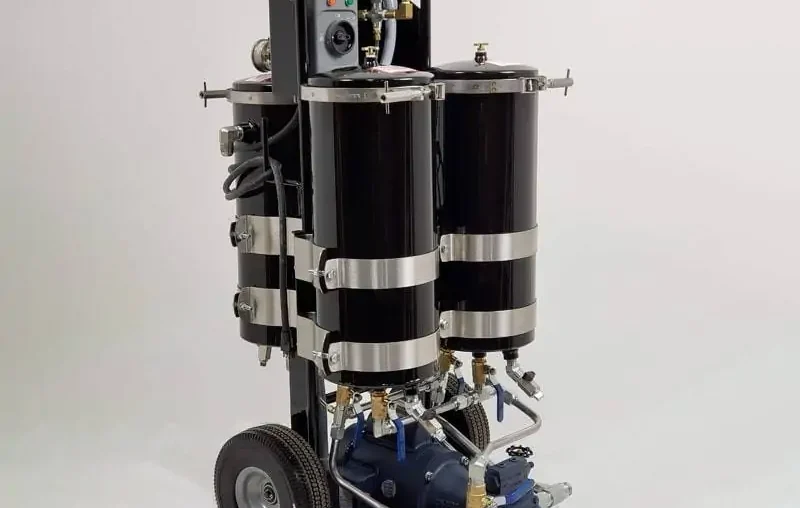Hydraulic systems rely on clean oil to function efficiently. Contaminated oil can cause excessive wear, reduce system performance, and lead to costly breakdowns. A hydraulic filter cart is a portable filtration system designed to remove contaminants, extend oil life, and improve equipment reliability.
In this guide, we will cover everything you need to know about Harvard filters carts, including their benefits, working principles, types, step-by-step usage, and maintenance tips.
1. What is a Hydraulic Filter Cart?
A hydraulic filter cart is a mobile filtration unit used to clean hydraulic fluids, lubricants, and other industrial oils. It helps in removing solid particulates, water, and other impurities from the system, preventing damage to pumps, valves, and actuators.
Key Features of Hydraulic Filter Carts:
✅ Portable Design – Easy to move between different machines and workstations.
✅ High-Efficiency Filtration – Capable of filtering out particles as small as 1 micron.
✅ Dual-Stage Filtration – Often equipped with two filters to remove both large and fine contaminants.
✅ Multiple Flow Rates – Available in different flow capacities to suit various applications.
✅ Versatile Applications – Suitable for hydraulic systems, lubricating oils, turbine oils, and more.
2. Benefits of Using a Hydraulic Filter Cart
A. Extends Equipment Life
-
Removes harmful contaminants that cause wear and tear.
-
Prevents premature failure of hydraulic components.
B. Improves Oil Cleanliness
-
Enhances fluid quality, reducing the need for frequent oil changes.
-
Ensures optimal lubrication and cooling within the system.
C. Reduces Maintenance Costs
-
Minimizes unplanned downtime by keeping oil clean.
-
Lowers repair and replacement expenses for hydraulic components.
D. Enhances System Efficiency
-
Prevents clogging and flow restrictions.
-
Helps maintain optimal hydraulic pressure and system performance.
E. Supports Environmental Sustainability
-
Reduces waste oil disposal by extending oil life.
-
Promotes cleaner and more energy-efficient operations.
3. Types of Hydraulic Filter Carts
1. Single-Stage Hydraulic Filter Cart
-
Uses one filter element to remove contaminants.
-
Ideal for low-contamination environments.
2. Dual-Stage Hydraulic Filter Cart
-
Equipped with two filtration elements:
-
Primary filter: Removes large contaminants.
-
Secondary filter: Captures fine particles and moisture.
-
-
Suitable for highly contaminated fluids.
3. High-Flow Hydraulic Filter Cart
-
Designed for applications requiring faster oil filtration.
-
Used in large industrial machinery and power plants.
4. Water Removal Filter Cart
-
Features special filters to remove water from hydraulic fluids.
-
Essential for industries where moisture contamination is a concern.
4. Step-by-Step Guide to Using a Hydraulic Filter Cart
Step 1: Gather Required Equipment
✅ Hydraulic filter cart
✅ Clean container (if transferring oil)
✅ Safety gloves and goggles
Step 2: Inspect the Filter Cart
-
Check that the filters are installed correctly.
-
Ensure the hoses are in good condition and securely connected.
Step 3: Connect the Filter Cart to the System
-
Locate the inlet and outlet connections on the hydraulic system.
-
Attach the suction hose to the reservoir and the discharge hose to the return line.
Step 4: Start the Filtration Process
-
Turn on the hydraulic filter cart and let it run.
-
Monitor the pressure gauges for proper operation.
Step 5: Monitor Oil Flow and Contaminant Levels
-
Check the filter indicator to determine when the filter needs replacement.
-
Observe the oil condition during the filtration process.
Step 6: Shut Down and Disconnect
-
Once the oil is cleaned, turn off the filter cart.
-
Remove the hoses and properly store the equipment.
Step 7: Dispose of Contaminated Filters Properly
-
Replace clogged filters and dispose of old ones according to regulations.
-
Keep a record of filtration cycles for future maintenance planning.
5. Maintenance Tips for a Hydraulic Filter Cart
A. Regularly Inspect Filters
-
Replace clogged filters as needed to maintain efficiency.
-
Use high-quality replacement filter elements for best results.
B. Check for Leaks
-
Inspect hoses, fittings, and seals for any oil leaks.
-
Tighten loose connections to prevent air or fluid loss.
C. Store the Cart Properly
-
Keep the filter cart in a clean, dry place when not in use.
-
Protect it from dust, moisture, and extreme temperatures.
D. Monitor Oil Cleanliness
-
Perform regular oil analysis to assess contamination levels.
-
Use the hydraulic filter cart as part of a preventive maintenance program.
E. Follow Manufacturer Guidelines
-
Adhere to the recommended service schedule for optimal performance.
-
Use only compatible filters and spare parts specified by the manufacturer.
6. Choosing the Right Hydraulic Filter Cart
When selecting a hydraulic filter cart, consider the following factors:
🔹 Flow Rate: Ensure the cart can handle your system’s required flow rate.
🔹 Micron Rating: Choose the right filtration level based on oil contamination levels.
🔹 Filter Type: Determine if you need particle removal, water removal, or both.
🔹 Portability: Select a model that fits your workspace and mobility needs.
🔹 Compatibility: Ensure the filter cart is compatible with your hydraulic oil type.
7. Where to Buy a Hydraulic Filter Cart?
Hydraulic filter carts are available from industrial filtration suppliers and online stores. Choose a reliable supplier that offers:
✅ High-quality filter carts with advanced filtration technology
✅ Genuine replacement filters and spare parts
✅ Technical support and maintenance services
Conclusion
A hydraulic filter cart is an essential tool for maintaining clean oil, extending equipment life, and reducing operational costs. By removing contaminants and moisture, it ensures your hydraulic system runs smoothly with minimal downtime.
By following proper installation, operation, and maintenance guidelines, you can maximize the benefits of a hydraulic filter cart and protect your investment in industrial equipment.
For high-quality filtration solutions, consider purchasing from trusted manufacturers and suppliers that offer advanced hydraulic filtration technology.



